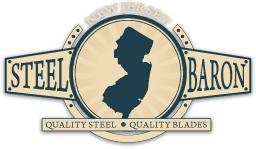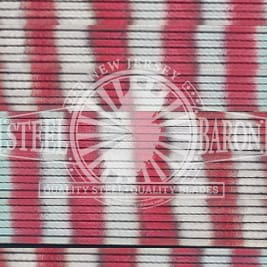Description
A chromium alloy steel traditionally used for bearings and other high-pressure applications, 52100 is excellent to use in forging, grinding, and cutlery production with a reputation for great toughness and durability on its own or forge-welded to other steels, such as 410 or 416.
Our 52100 comes pickled and annealed soft enough that it works like butter whether doing stock removal or forging. Few steels have as long a legacy or notoriety as 52100 when it comes to tough working steel.
Regardless if you’re looking to make a lean and mean kitchen machine or a hard use battle grade fighting blade, our 52100 is known as a champion steel in any arena and against any challenge.
As a deep hardening steel, 52100 offers all the benefits of high toughness and abrasion resistance while absorbing laughing off shock or taking a super fine edge in wicked thin knives.
And when it comes to clad materials, few steels are as readily accepted and recognized for the contrast and performance offered when used as a core steel.
It may be a little trickier to heat treat than more simple carbon steels like 1075, but when given the temperatures and soak times it needs, it will amaze you every time.
Only logged in customers who have purchased this product may leave a review.
Heat Lot Certifications
Listed below are our current LIVE and the most recently CLOSED material lot certifications per thickness:
| Previous | Current |
|---|
| 52100 .065 (1/16") | N/A | 540 |
|---|
| 52100 .094 (3/32”) | N/A | 571 |
|---|
| 52100 .125 (1/8”) | N/A | 1689 |
|---|
| 52100 .156 (5/32”) | N/A | 894 |
|---|
| 52100 .187 (3/16”) | N/A | 1567 |
|---|
| 52100 .250 (1/4”) | N/A | 1575 |
|---|
| 52100 .375 (3/8”) | N/A | 1307 |
|---|
52100 Heat Treat
You can download our 52100 Heat Treat PDF. It contains all of the information mentioned below.
Normalization
- Normalization is a process intended to refine grain and stress relieve blades prior to hardening when needed.
- Turco, ATP-641, foil, or similar may be used to reduce surface decarburization and scaling.
- Time at temperature suggested for varying thicknesses. Once knife has cooled to black and magnetic, it can be cycled again–be careful handling hot blades.
| 1st Cycle |
2nd Cycle |
3rd Cycle |
1,650°F / 898°C
Hold 10-15 minutes |
1,500°F / 815°C
Hold 10-15 minutes |
1,350°F / 732°C
Hold 10-15 minutes |
Hardening
- ATP-641, Turco, or similar high temperature anti-scale/decarburization coatings can be used to reduce scale or surface decarburization.
- Data is representative of controlled heat treating equipment (e.g. oven, salts, etc.) temperatures and industrial standard quenchant.
- Suggested quench oil: Parks 50–expected as quenched hardness may be lower if a slower quench oil or non-industrial quench medium is used.
- Austenizing soak time varies 5 to 15 minutes based on heat treating equipment and cross section–soak times are reduced to minimum for people heat treating in a forge–forge heat treating without PID temperature control limits accurate means of maintaining temperature. If using calibrated, proper industrial equipment for heat treating, use the supplied extended soak times based on over all steel thickness.
- Do not put blades in oven when cold, insert at or just below austenizing temperature–temperature variances is for difference in stock thicknesses and a window of margin for error.
| Austenizing Temperature |
Expected RC (as quenched) |
1,450V-1,480°F / 788-804°C
Soak 5-15 minutes |
64-65RC |
Tempering
- Once blade is quenched and near ambient temperature, blades should be tempered accordingly, the times suggested are to ensure even, consistent temperature.
- Figures supplied are as representative of industrial standards.
- If using a small toaster oven or household kitchen oven for tempering, using a blade holding rack made from kiln furniture, a roasting tray lined with fine sand, or similar large object will help retain thermal mass to reduce wide swinging temperatures as the device fluctuates trying to maintain temperature.
- Note: Final hardness values vary based on initial as-quenched hardness and percentage of conversion to Martensite. Only reliable testing methods, e.g. calibrated Rockwell hardness tester, can provide actual hardness values–hardness calibrated files and chisels are relative testing methods and inaccurate for true hardness value reading.
- Temper twice for 2hrs.
- The included Heat Treat Schedule on this page is formulated based upon Industry standards and data from ASM International, Crucible and other foundry spec sheets, and Kevin Cashen (independent researcher, ferroalloy metallurgist, and bladesmith of Matherton Forge).
| Temperature |
Hardness (2 hour x2 guideline) |
| 300°F / 149°C |
65 |
| 350°F / 177°C |
63-64 |
| 400°F / 204°C |
60-61 |
| 450°F / 232°C |
57-58 |
| 500°F / 260°C |
55-56 |
| 550°F / 288°C |
53-54 |
| 600°F / 316°C |
52-53 |
| 650°F / 343°C |
50 |
Heat Treating Disclaimer
- Suggested heat treatment are based on the recommended specifications for use in ovens, high temp salts, and similarly, properly calibrated equipment; and in line with proper industrial standards for quenching. Deviation from industry standards for schedules, equipment, quenching mediums; and hardness testing equipment may result in varied results. The supplied information on this page is on a generalized scale with the above mentioned standards and methods, which is why soak times and similar aspects may vary in time length to include a margin for the available heat treating equipment and steel cross section.
- If you are unsure if you have the necessary means to heat treat on-site, we recommend professional heat treating services provided by Peters Heat Treat or Bos Heat treating; or industry specific services by knife material dealers such as TruGrit or Texas Knifemaker’s Supply–check with suppliers to see if they offer HT services and ensure they follow industry standards.
- NJSB LLC is not liable or responsible if proper industry heat treating protocols are not applied; particularly and especially if sending to an independent heat treat provider if they do not follow the intended heat treat schedule or standards for that particular steel; or damage they cause while in their possession.








Thomas Hacker (verified owner) –
I use 52100 exclusively in all of my knives, so I have a bit of experience with it. I have bought it from many places over the years and NJ is my top pick by far. The bars are always nice and flat. No crinkled edges or dips and valleys in the flats.
They also come a little over sized which is always well appreciated!
I can’t explain how frustrating it is when a supplier sends a bar that is slightly UNDER thickness or other dimensions. It throws off all of my calculations.
I’ve even had to order new bars of steel in some circumstances!
Really happy to have NJ and that little bit extra goes a long way. Thank you for all the hard work!